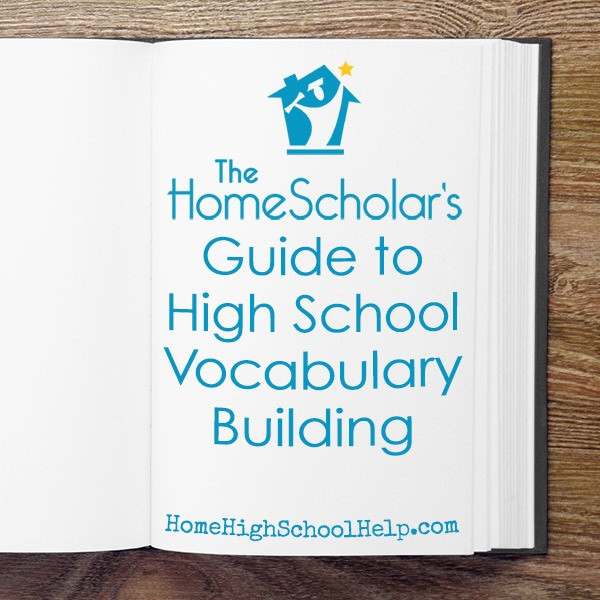High School Vocabulary for Homeschool Students
When children have reached the point of reading and writing well, working on vocabulary development can change from previous years. I have a variety of ideas for high school vocabulary development that can help you with your teenagers. You can read through them, and see if you can find suggestions that will help you with your child, in your unique situation. Find my full article here.
This post contains affiliate links . If you click and buy I make a few pennies, but sadly, not enough for a latte.
Build High School Vocabulary
With my own children, we used literature as a way to practically teach vocabulary. When you read real books with your children, they will get repeated exposure to the words that you want to stick. When you use only vocabulary language learning (vocabulary curriculum), they may see the word once or twice, or study it for a week, then they move on, and likely forget what they have learned. Of course, combining vocabulary learning through curriculum options with reading real books, that's the success plan that can help your child learn what will be needed for success on the high school tests.
For vocabulary, if I remember my statistics correctly, research shows that it takes two years of hearing a word before teens actually start using the word, naturally. Wordly Wise is extremely popular, and you can look at that as one of the language curriculum ideas we talked about above. We also used the Kaplan SAT® Score-Raising classics to improve vocabulary in our homeschool. If you have never seen those books before, they are a great way to focus on vocabulary building using real, high quality literature. Each book has hundreds of vocabulary words frequently tested on the SAT® that are highlighted throughout the text. The definitions for each highlighted word are on the facing page, so a quick glance will help teens understand the word in context. It also has a pronunciation guide and an index for easy reference. These are some of the books we used in my own home. Books that may appeal to young women
Books that may appeal to young men
- Dr. Jekyll and Mr. Hyde: A Kaplan SAT® Score-Raising Classic
- Frankenstein: A Kaplan SAT® Score-Raising Classic
- The War of the Worlds: A Kaplan SAT® Score-Raising Classic
Books that may appeal to young women
- The Scarlet Letter: A Kaplan SAT® Score-Raising Classic
- Wuthering Heights: A Kaplan SAT® Score-Raising Classic
Consider the boxed set to get a blend of great books
Working your way through a few of the books on my College Bound Reading List can improve vocabulary as teens enjoy real books. It's not a checklist, it's only a list of often-read books that colleges recognize. Showing a few books from the College Bound Reading List on your reading list can show that your child is well-read, and prepared for college level work. If you are already reading classics, you may want to branch out for your vocabulary building.
Another way that we used to practice vocabulary was to use the Great Courses lectures (Here's an example of the Music series that we used.). These are college level lectures, so be sure to preview them ahead of time to 'ok' the content of the lecture. However, your children will get great teachers presenting great college level lectures where your children will be able to practice hearing the vocabulary they have been studying. In addition, when I would have my children watch those lectures, I would also have them practice their note-taking.
Build Spelling in High School Vocabulary
My girlfriend has children with dyslexia. She tells me the best program is always the THIRD spelling program you try. That's probably true ... because by that time you begin to figure out your child and understand the problem better! She recommends Sequential Spelling - it was the third (and final) spelling program she tried.
Recently I've been hearing about another program that works well with my clients. Have you heard about All About Spelling yet? It might be a good match for you. It is multisensory, approaching spelling through sight, sound, and touch. The lesson plans are easy to use and leave nothing out. Plus, I've spoken to homeschool parents that say it works!
I used Spelling Power myself. It's a 2nd-12th grade program, so it's easy and inexpensive to use with multiple children. Time for a reality-based intervention here, though. When my kids started using Spelling Power my husband and I tested our OWN spelling level. My husband was an engineer and manager at a "major northwest aerospace firm" and would write every day as part of his job. We found out that he would sometimes spell at a 7th grade level. I have a bachelor's degree in nursing, and I spell at a 9th grade level. I enjoy teasing my husband about his spelling whenever I can (now, for example). Both of our kids can spell circles around us!
If your child is spelling "at grade level," that's wonderful! It's nothing to worry about or be ashamed of! Encourage your speller as much as you can. At some point in high school, spelling is no longer taught as a separate subject, but is instead incorporated into writing. I don't encourage you to have a wanton disregard for spelling - I'm just saying that adults are able to compensate for spelling, and your child can compensate as well. With dictionaries, spell check, they can overcome spelling as poorly as we do!
I'd love to hear about how you are helping build your child's high school vocabulary! Please comment and share!
SAT®, AP®, and CLEP® are trademarks owned by the College Board, which is not affiliated with, and does not endorse, this blog post or The HomeScholar, LLC.
When you subscribe to the blog, we will send you an e-mail when there are new updates on the site so you wouldn't miss them.

 Login
Login








.jpg)

Comments